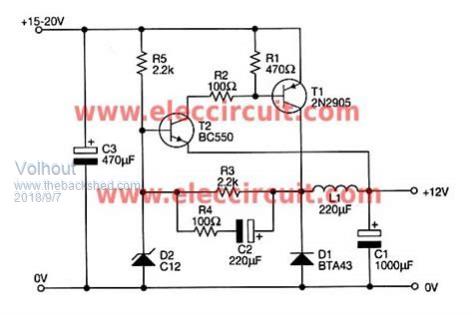
|

|
Forum Index : Microcontroller and PC projects : Simple Buck-Boost reg for 90c...
| Author | Message | ||||
Grogster Admin Group Joined: 31/12/2012 Location: New ZealandPosts: 9877 |
I came across the MC3x063A Buck-Boost regulator IC, available at Element14 for 90 cents each - and that is in NZ money.  It is a lower-power device, but perfectly suitable for many things. 3-40v input voltage, 3-40v output voltage. Up to 1.5A output(500mA or so continuous load) Adjustable. 100kHz switching frequency. They use a 220uH inductor for all voltages and loads(when configured as a buck-converter), which makes it a nice device to use, as many other switch-mode regulator IC's such as the LM3596, require that you choose the correct value inductor depending on load.(that is probably common for higher-power output switch-mode converters though) Including the inductor, only eight external parts are needed to program this thing for any voltage you like inside 3-40v. Two more optional components form an LC filter on the output if you wish(generally a good idea). Smoke makes things work. When the smoke gets out, it stops! |
||||
| OA47 Guru Joined: 11/04/2012 Location: AustraliaPosts: 1036 |
Good find G. I have a project that these units may suit. OA47 |
||||
| Frank N. Furter Guru Joined: 28/05/2012 Location: GermanyPosts: 1046 |
I use this chip since many years. It works very fine and I had never problems with EMC...  |
||||
| Volhout Guru Joined: 05/03/2018 Location: NetherlandsPosts: 5703 |
Yip, the old NS chip still going strong. This is already an oldie. It could be the second longest produced chip (after the 555). Currently it is not so popular anymore because it's efficiency is less than the newer FET based designs. These new ones also tend to switch at higher frequencies, allowing for smaller inductors, smaller footprint, cheaper. But yeah....the old ones are still going. Like me... Sometimes I even grab my proven circuit with 2 transistors. Like this one.  Just change the zener to 5.6V and you get 5V out of it. And..absolutely NOT short circuit protected... keeps you sharp. Volhout PicomiteVGA PETSCII ROBOTS |
||||
Chopperp Guru Joined: 03/01/2018 Location: AustraliaPosts: 1116 |
Interesting. I assume L1 = 220uH ChopperP |
||||
| Warpspeed Guru Joined: 09/08/2007 Location: AustraliaPosts: 4406 |
There are many of these "simple" power supply circuits out there, and they do work. But you need to be a bit careful of anything that uses a series pass device. Think about what happens if the switching device fails, and that may easily happen if there is no built in current limit circuit and you slip with a multimeter prod for example. If you put +40v down the +5v supply rail because a series switching device fails shorted, then it can do massive damage, even destroy tracks on the board. Its just not worth the risk. Much better to use a circuit design that always drops the output to zero under any mode of failure. A capacitor charge pump (for very low power) or a flyback supply for higher power will just stop transferring energy if it does go bang, and the output power is naturally limited if it become seriously overloaded. When you remove the output short it just springs back. Cheers, Tony. |
||||
Grogster Admin Group Joined: 31/12/2012 Location: New ZealandPosts: 9877 |
I hear you.  The device I linked to DOES have short-circuit current limiting though, to protect the output transistors in the device. See description on page 1 of the PDF.  Further to that, page-12 of the PDF says with a 5v output voltage set, short-circuit current limit is 910mA with 0.1-ohm on the output. So, I think they are REASONABLY tough. In other words, you can't easily kill the output switching transistors in the device by accidental short-circuit of the output. Smoke makes things work. When the smoke gets out, it stops! |
||||
Grogster Admin Group Joined: 31/12/2012 Location: New ZealandPosts: 9877 |
ON Semiconductor do a version of this chip with some extra features: - Higher frequency operation (150kHz instead of 100kHz) - Internal thermal shutdown with hysteresis - Cycle-by-cycle current limiting NCP3063 These are $1.37 in NZ money, so 48 cents more, but I think this is probably a better version of the device and will probably be the one that I go for. It is available in SOIC and DFN. They did used to do a DIL one, but that has been discontinued from what I can find. Price drops to $1.17 if you get ten or more - that is only 28 cents more then the Texas Instruments original part, but you get the extra features. The ON semi's PDF also seems to have much better detail then the TI one. EDIT: ON Semi have a beautiful spreadsheet for calculating all the component values here. This makes choosing the parts about as easy as it can ever get.  Smoke makes things work. When the smoke gets out, it stops! |
||||
| Lou Senior Member Joined: 01/02/2014 Location: United StatesPosts: 229 |
Anyone have any info on lower power voltage multipliers, maybe like Dickson charge pump or similar? I could use something like that, take a 9v battery up to about 33v at maybe 10-20ma. Could be IC or discreet components, could drive the pump with port lines from uMite 170 chip. Thanks, Lou Microcontrollers - the other white meat |
||||
| Warpspeed Guru Joined: 09/08/2007 Location: AustraliaPosts: 4406 |
Thirty volts at 30mA is almost one watt, hardly very low power and probably beyond a practical capacitor charge pump. That MC3x063A Buck-Boost regulator IC Grogster suggested would do it easily. Maximum output voltage is limited to +40v max so you are well within that limit. Check out the data sheet section 9-2-2 Step-up converter. Cheers, Tony. |
||||
| The Back Shed's forum code is written, and hosted, in Australia. | © JAQ Software 2026 |